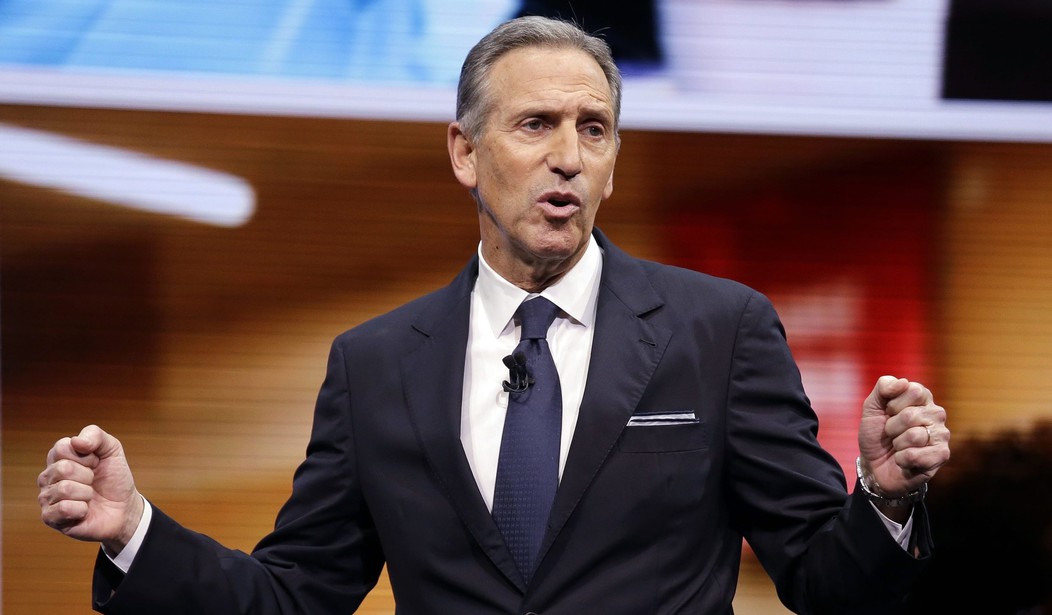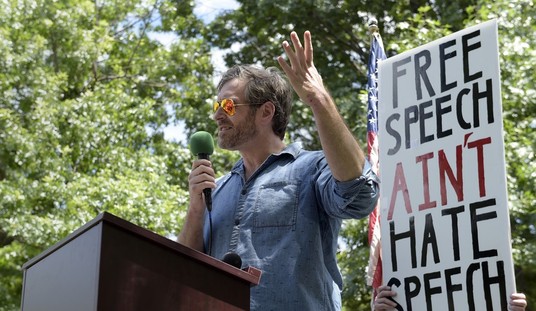WASHINGTON – Starbucks Executive Chairman Howard Schultz said the world is “questioning the moral leadership of America” and he urged the public to reject nationalism.
“We are living at a very unusual time and I don’t think it would be an overstatement, especially this week, to say that the country is facing a real crucible,” Schultz said after accepting the Atlantic Council’s Distinguished Business Leadership Award on Thursday evening. “And I think you can broaden that and kind of ask the rhetorical question about the crucible of leadership.”
Schultz recalled visiting Auschwitz for the first time and finding a stone in the sand, which he laid on the podium.
“I’ve had that rock on my desk to constantly remind me not only to never forget, but in an age of uncertainty, especially the last couple of years, to remind me of the best of America. Now, it’s been 75 years since the end of World War II and I think many today, unfortunately, at home and many around the world – and I travel a great deal – are questioning the moral leadership of America, and the ideals of America and what this rock not once, but still, represents,” Schultz said. “I say straight away that my company and what we do at Starbucks is not a proxy for the country or leading the country, but our values and guiding principles, I think, are steeped in American values.”
Schultz named some of the benefits Starbucks employees have received over the years.
“The aspiration was to build a different kind of company, a company that would achieve the balance between profit and conscience, a company that would demonstrate that not every decision is an economic one, a company that would demonstrate success is best when it’s shared,” he said.
“And do things that were unheard of – ownership for every employee, comprehensive health insurance over 20 years before the Affordable Care Act, free college tuition for every employee. All of these things steeped not in marketing or PR but steeped in the understanding that we have to create opportunity for everyone,” he added.
Schultz argued that private businesses like Starbucks must address social issues in America and “pick up the slack” of the “political class” in order to solve problems.
“Now, we are living at a time both at home and abroad where the challenges are significant and acute. We have significant systemic issues – social issues in the country – and as a result of that, I feel so strongly that today businesses and business leaders must understand that we are living at a time where the rules of engagement for a public company are very, very different than they’ve ever been, because we must pick up the slack and, unfortunately, the lack of responsibility of the political class,” he said.
“There are a lot of important people in this room who have a great deal of influence on the future of our country and the future of our world. In my view, as a private citizen who travels the world, perhaps more than many of you here, there are real questions and real concerns and real doubts about the strength and conviction and moral courage of the United States of America. The Atlantic Council stands for relationship-building, trust and confidence among our allies. This is not a time for isolationism, for nationalism,” he added.
Schultz continued, “This is a time, as we face this crucible, for cooperation. This is not a time to build walls. This is a time to build bridges. Over the course of the last year, I wanted to do a number of things that would give me exposure to the human condition here at home and abroad. I wanted to understand the opioid crisis. I wanted to go to the southern border in Texas and understand the immigration issues. I wanted to go to Gettysburg and I wanted to go to Normandy.”
Some have speculated that Schultz might run for president in 2020. Schultz has said he has no plans to enter politics.
“I’m going to stay with citizenship – that’s what I’m committed to and I think that’s where I belong at this time,” he said on Thursday.
In the afternoon, Schultz participated in a discussion on “The Role and Responsibility of a Global Company,” in which he addressed the controversy surrounding the arrest of two African-American men inside of a Starbucks store in Philadelphia.
“Our stores are not public bathrooms, but they’re used as such. In this particular case, two African-American gentlemen came in the store – like millions of other people – to sit down and have a meeting and one of them asked to go to the bathroom and we have kind of a loose policy around you should be able to use the bathroom if you buy something and it’s really the judgment of the manager. And in this particular case, she asked the gentleman: Are you a customer? And he said, no. And they go into a conversation and one thing led to another, and she made a terrible decision to call the police,” Schultz recalled.
“The police came, en masse, and in 10 seconds handcuffed the guys – thank God they didn’t resist – and they were arrested and we were absolutely wrong in every way. The policy and the decision she made – but it’s the company that’s responsible. And when this happened, we flew en masse to Philadelphia. We stayed there for days and we did everything we could to demonstrate contrition, to immediately go on social media and national TV and apologize and have conversations with local clergy and all of the people we needed to talk to in Philadelphia for them to understand the level of compassion and empathy we had for the situation,” he added.
Schultz emphasized the importance of the racial bias training that Starbucks employees will undergo on May 29, explaining that “every store in the country” is going to close in the afternoon on that day.
“Since the Philadelphia incident, we have been working diligently inside the company and with outside resources to create a curriculum of training, because I think it’s fair to say that most people have some level of unconscious bias based on our own life experience. And so there’s going to be a lot of education about how we all grew up and how we see the world and how we can be better,” he said.
“And that curriculum and that education is the beginning, not the end, of an entire transformation of our training at Starbucks, which, in addition to everything we do operationally, will stay inside the company. We’re also going to open-source it and make it available to every other company,” he added.
Schultz reflected on Starbucks’ attempted “Race Together” campaign that ended in 2015 after backlash on social media. According to Schultz, the idea came out of a companywide meeting he had organized.
“I think with horror and shame what we witnessed as Americans in watching Trayvon Martin and Eric Garner and others be murdered, and there was great unrest in the country. And this is not in any way to criticize or in any way pit one group versus another, especially those people who wear the uniform of policemen every day,” he said.
“But the truth of the matter is that racial divide was really, I think, on the rise during that time two-and-a-half years ago, and certainly today we have a significant divide in the country as well. We looked at that and I decided that we should have a companywide meeting, unscripted just like this, where we would just talk about race, racial divide, unconscious bias, and give everyone in our company a companywide forum to share,” he added.
When asked why they eventually decided to pull the plug on the campaign, Schultz replied, “We did not shut it down because we thought we were wrong to do it. We shut it down because we thought our people were going to be in danger and that’s a whole other issue with regard to, I think, the systemic issue and the divide in the country.”
Schultz declined to answer follow-up questions from reporters after the event.









Join the conversation as a VIP Member